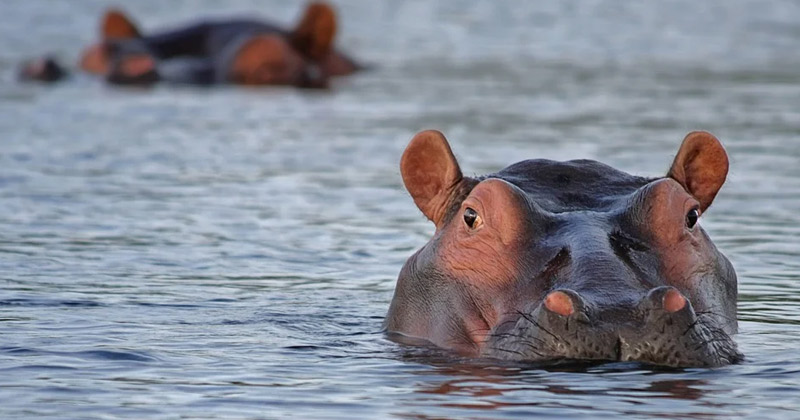Drowning is a form of suffocation. Lungs filled with a significant amount of water can no longer absorb oxygen from the air. This inevitably leads to shortness of breath, later to unconsciousness and respiratory failure. The death by drowning fundamentally threatens all living creatures that breathe through lungs, even if their natural habitat is the water. Hippos are second largest mammals in the world, they are aquatic creatures & spend most of their life in and near water bodies. So, the question arises, can hippos drown?

Even hippos take in the oxygen they need to live without exception through lung breathing. So, can hippos drown? Indeed, even hippos can drown if they don’t regularly take air from the surface of the water.
Breathe Every Five Minutes
But the animals even do this in their sleep. Hippos automatically appear again and again to breathe, even when they are resting. They rarely stay underwater for more than three to five minutes. Theoretically, they could extend their dive up to 30 minutes, the nostrils would close. But assuming that floods pushed a hippo’s head underwater for more than half an hour, the animal would hardly have a chance of survival. It might also be difficult to save itself because, contrary to what you might think, hippos are not good swimmers.

Of course, whales have a lot ahead of them on this point. But even the large marine mammals do not have gills, but rather breathe through their lungs.
So whales always need a helping of oxygen from the air. They hold their breath underwater. Some species manage to do this for a very long time, like a duck whale can dive for up to two hours, a sperm whale for 90 minutes, some furrow whales appear every 40 minutes to catch their breath and dolphins can go a quarter of an hour without breathing. Typically, however, dolphins let air flow into their blowhole five to twelve times a minute, when they are awake.
– Hippo Facts
Sleeping dolphins appear at least once a minute above water to take in oxygen. It can also be seven times if the rhythm is irregular. However, the animals’ way of sleeping ensures that breathing takes place and is always in good time. In dolphins, only half the brain is resting. The other half of the brain stays awake. One speaks of half-side or half-brain sleep. The active side of the brain ensures that dolphins can also breathe while they sleep. If that didn’t happen, they too would suffocate or drown.

Incidentally, crocodiles also have lungs that are not allowed to fill with water. When diving, the throat of the reptile closes with a special flap. This mechanism ensures that crocodiles cannot drown even when their mouths are open. However, if it tried to swallow an animal underwater, it would be bad luck.
Also Read: Why Can Parrots Speak?
So, What About Fish?
As is well known, they breathe through their gills and thus absorb the oxygen dissolved in the water. Nothing can go wrong, can it? Yes, for some species it is. Sea sharks can drown. Deep-sea sharks are cartilaginous fish that swim with their mouths open. They do this so that water flows through their pharynx, which then exits through the cleft gills.
Also Read: Why Can’t Dogs Eat Chocolate?
Oxygen is withdrawn from the water, which then enters the animals’ bloodstream. These sharks are constantly forced to swim so that enough water flows over their gills and their oxygen needs are met. If deep-sea sharks get caught in fishing nets so that they are held underwater, they will not get enough oxygen and hence, will suffocate.


